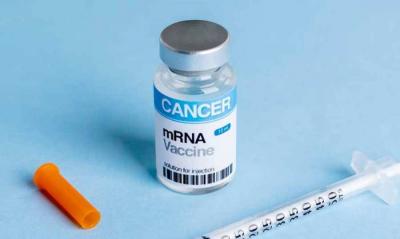The Russian "Gamaleia" Center is currently conducting preclinical trials on a revolutionary cancer vaccine, according to "Russia Today". The center's academic head, Alexander Gintsburg, recently answered some questions related to the anticipated vaccine in a press interview.
Regarding the vaccine's mechanism of action, Gintsburg said: "Our cancer vaccine is therapeutic, meaning it's intended for individuals already suffering from cancer. It is called a vaccine because it is designed to activate our immune system. Through this, we will make the lymphocytes work to recognize and destroy cancer cells. Each patient will receive an individualized vaccine, but using the same technology. Doctors will take samples from tumors and healthy cells, and researchers will compare them to identify the mutated parts. These specific parts will become the basis for the vaccine, and once injected into the body, they will attract lymphocytes that will destroy the administered cells, remember them, and begin to combat the cancer cells. This mechanism has been successfully applied to laboratory animals, indicating that this method is promising."
Gintsburg noted that "the vaccine will not be administered intravenously, as its composition would lead it to the liver, providing no benefit. It is better to inject it directly into the tumor if doctors can access it, or it can be injected intramuscularly, as studies have shown that this method will help distribute the medication evenly throughout the body, making it effective."
He explained that "this will depend on the immune response in the body towards the components injected with the vaccine. It will be possible to include several different cells in one vaccine, and the body's reaction will vary in intensity for each cell. The stronger the immune response, the fewer injections will be needed; treatment may require one or two injections, but if the immune response is weak, more injections will be necessary, averaging up to five."
In response to a question regarding whether the vaccine could become a standalone treatment for cancer or if it would be better to use it with other methods, he replied: "Initially, we thought the vaccine could treat cancer on its own, but it has become clear that it would be more effective when used in conjunction with a known method among oncologists called 'checkpoint blockade'. Without the vaccine, when killer lymphocytes begin to affect the tumor, proteins are produced that inhibit these cells' activity. Therefore, antibodies have been developed to prevent the tumor from releasing these proteins, making it essential to apply this type of treatment alongside the vaccine so that the trained lymphocytes can easily destroy the tumor."
He added: "The success of clinical trials for the new vaccine will aid in combating various types of cancers for which there is currently no effective treatment, such as certain skin cancers, lung cancers, and pancreatic cancers, for example. With these diseases, even reliable and older methods for surgically removing tumors do not yield effective results due to potential recurrences. The vaccine technique helps the patient's immune cells recognize and remember cancer cells, allowing them to fight it if the disease resurfaces."




